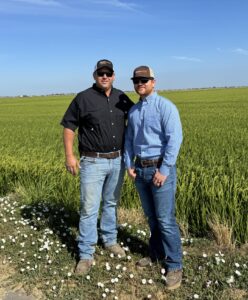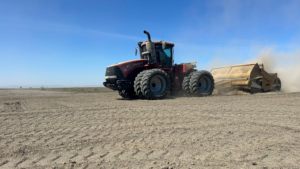Growing Together Fall 2024
Four Generations of Practical Innovation and Counting
Water has long been a contentious issue in California agriculture. Just as long-standing is the McKenzie family’s focus on innovation, especially as it relates to the smart, efficient use of the valuable resource on the rice acres now under the management of Brian McKenzie. He’s the fourth generation to tend his family’s increasing rice acreage in Placer, Sacramento, Sutter and Yolo counties.
Brian’s grandfather Ross McKenzie returned from his military service during World War II to farm with his father-in-law, Albert Scheidel, who then raised wheat and other dry-land crops. When rice grew in popularity in the Sacramento Valley, the family transitioned most of its acres to the crop. After working an off-farm job for a few years, Brian’s father, Chris McKenzie, returned to manage the farm in 1983 when his son was born. After working off the farm for a few years upon graduating college himself, Brian followed in his father’s footsteps.
“Farming had been in front of me all those years growing up, though I went and did something else after college,” Brian said. “After being away, I decided farming was the right thing for me. I realized it was what I wanted to do the rest of my life.”
A long history of practical innovation in rice production
That decision ushered in the latest generation of McKenzie innovation in the Sacramento Valley, largely around water use and efficiency. Brian’s grandfather was among the first farmers in the area to begin removing contoured levees on rice acres. This made both water use and equipment operation more effective, ultimately enabling him to become more efficient with the use of irrigation water. Two generations later, Brian admits his predecessors weren’t the only farmers to adopt the new management system. But both his father and grandfather were some of the first to bring wild rice production to the Sacramento Valley, allowing them to capitalize on a new crop for which demand grew quickly.
“We were some of the pioneers of wild rice farming in California after my grandfather and father were among a small group of growers who brought it in from Minnesota,” said Brian, who characterizes his own approach to innovation as “keeping up with the times.” “They basically established a wild rice market for California.”
Brian’s close monitoring and prudent use of irrigation water — built on an ethic of innovation that stretches back to his grandfather — has equipped him to succeed where others have not, given the same amount of water.

“From stand establishment and weed control to the health and stature of the plant itself, water management is everything,” said Grow West PCA Drew Mullaney, an agronomic advisor to McKenzie. “Brian has really thought outside the box on how to get more out of his water on tough-to-farm ranches where others have struggled.”
Mullaney’s main role on the McKenzie farm is managing weed control and soil fertility.
“The day the water is introduced to the field, weed seeds begin to germinate. This immediately gives them a head start on competing with the rice. The faster you can get the water to the bottom of the field and begin sowing really sets the stage for how the rest of your growing season will turn out,” Mullaney said. “Most of our soils are very heavy in texture with very few nutrients. We apply macronutrients nitrogen, potassium and phosphorous every year. Occasionally, we will supplement zinc and other micronutrients, always aiming to replace what the previous year’s crop removed. The soils we work with are excellent at holding water, which is great for rice farming. But that’s about it.”
Innovating to make the most of irrigation water
Those challenges don’t stop McKenzie from consistently advancing his family’s rice production, both in terms of yield and overall acreage. His innovation starts before a grain of rice is even planted, with precision leveling that ensures inputs like herbicides and fertilizer are most effectively utilized by the rice plants across the entire field.

“Precision leveling is a big cost for growers due to the hours and equipment it requires; however, they are willing to make the investment as it pays back in crop yield,” said Mullaney.
Brian is quick to credit Mullaney with having a critical role in the success of their farm. The Grow West PCA and longtime partner in his operation has taken steps to increase profitability on every acre of McKenzie farms.
“Drew has helped us make this happen on several different ranches where others would say it’s impossible,” Brian said. “Others would say ‘it is what it is’ and would think there’s no way. But he’s helped us get the most out of our fields.”
Decision-making on new innovations
McKenzie describes his financial management strategy as fairly conservative, a philosophy he learned from his father. He’s not one to spend much time pondering a production management change or innovation on his family’s farm. Always with an eye on his farm’s bottom line, he makes quick decisions based on things like weather forecasts that help him maximize crop yield and quality no matter the environmental conditions. Ultimately, it’s all about flexibility and the ability to react quickly to maximize crop output in ever-changing environmental conditions.
“If we work our fields when there’s too much moisture in these heavy clay soils, it’s going to get hard and compact, we’ll see weeds get a jump-start and we’ll drive Drew and Grow West nuts trying to control them,” Brian said. “Long story short, it’s all about the weather; if I see a storm coming, I might switch everything we’re doing to get as much done in our 100 rice fields before it hits. We might say ‘Let’s pull everything back and get these 10 fields planted before it rains rather than keep going as scheduled and have to rework everything.’ We always work to play our options and make the best decision based on what’s happening in each field.”
Though he’s been able to continue the decades-long trends of practical innovation and growth on his family’s farm, Brian knows he’ll face some uncertainty moving forward, with suburban development continuing to exert pressure on his fields, especially those closest to Sacramento and the city’s airport. But he also knows all his predecessors have faced their own unique challenges in growing the family’s farm and he’s confident that though it may look different in the future, the McKenzie family farm will continue as one of the region’s innovative rice operations.
“My father taught me how to have short-term memory for some things but be able to access long-term memories of things that keep you motivated to advance the farm,” Brian said. “When you have a bad year, you just have to pick yourself up, figure out what you did wrong and do something different the next year. Farmers are resilient people for a reason.”
